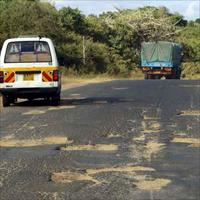World Bank Approves a Grant of US$50 million for Roads in the Democratic Republic of Congo

The World Bank Board of Executive Directors today approved a US$50 million grant to help reopen and maintain 1,800 km of roads, critical for the physical reunification, for achieving high, sustained and shared growth and for reconnecting the social fabric of the Democratic Republic of Congo (DR Congo) as the country recovers from a decade of civil war.
The High Priority Roads Reopening and Maintenance (Pro-Routes) project builds on previous Bank’s efforts which helped construct almost 4,000 km of roads. The 1,800 km of earth roads envisaged in three provinces out of eleven under this project will serve the highest populated areas and connect to a network of about 7,000 km of high-priority roads already funded by various donors, including the International Development Association (IDA), the World Bank’s soft lending arm. The roads targeted are Kisangani-Buta-Bondo-Bunduki (620 km) crossing Orientale Province and connecting to Equateur Province; and Uvira-Kasomeno (1,180 km) crossing the Sud Kivu and Katanga provinces.
The Pro-Routes project fits the road paving program to be funded by China either by connecting to it or by reopening sections that will be upgraded to paved standard.
“This project complements the massive investments in roads announced by the Chinese and is an illustration of the extent to which donors are willing to join forces to achieve quick and significant results on the ground, in ways that improve harmonization, cut transaction costs and ensure that donors are aligned with the priorities defined by the country,” said Marie-Francoise Marie-Nelly, the World Bank Country Director for DR Congo and Congo.
Pro-Routes project is co-financed by a multi-donor Trust Fund managed by the World Bank. An administrative agreement for an amount equivalent to US$75 million in support of the project was signed on March 17, 2008 with UK Department for International Development (DfID). DFID and IDA contributions may be increased in the future. Other donors – notably the European Commission, the African Development Bank and Belgian Cooperation - have expressed interest in joining the Trust Fund.
“Thanks to an expandable design built into the project, any new funds would be used seamlessly to help increase the scope without altering the nature and the concept of the operation. For example, a four-fold increase would fund the completion of the reopening and maintenance of the country’s entire high-priority road network,” said Alain L. Labeau, the World Bank’s Task Team Leader for the project.
DR Congo has identified a high-priority road network of 15,800 km of which 9,135 km of unpaved roads have been targeted for fast reopening under reduced technical standards supported by this project. The financial needs for rehabilitating the high-priority network, without upgrading to paved standard, are estimated at US$650 million.
Recognizing the vulnerability of earth roads to rainfalls and heavy trucks even if limited in number, an extensive maintenance program has been put together, initially funded by the project, and thereafter by a Road Maintenance Fund established under the project. The project also includes a program to develop the currently weak road construction industry and raise it to the challenge of rebuilding and maintaining tens of thousands of kilometers of roads scattered over DR Congo, a country the size of Western Europe. The project also provides targeted technical assistance to increase the capacity of DR Congo’s public works ministry and its Office des Routes to strategically manage and develop the road network in a budget constrained environment.
Pro-Routes is built on a comprehensive social and environmental program to offset potential adverse impacts in line with the Action Plan approved by the Board on January 10th in response to the Inspection Panel report
Adequate mitigation measures have also been taken to ensure that these roads – some of which cross and facilitate access to natural resources, traversing the second largest rainforest in the world – do not constitute a threat to the environment. Accordingly, it includes a comprehensive social and environmental program to offset potential adverse impacts in line with the Action Plan approved by the World Bank Board last January 10 in response to the Inspection Panel report. It will help strengthen local institutions in charge of forests and protected areas, partner with civil society organizations, and encourage the active participation of the local communities along the road corridors. For each dollar spent on road reopening and maintenance, 25 cents are spent on the social and environmental mitigation program.
 Back and Next - Back and Next
Back and Next - Back and Next See Also - See Also
See Also - See Also